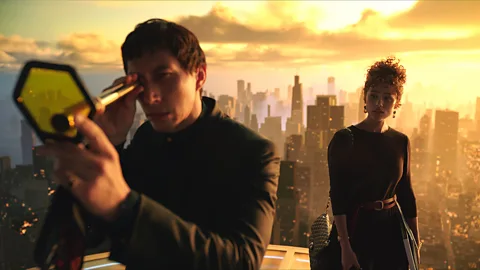Megalopolis film review: Francis Ford Coppola's passion project is a 'pretentious, portentous curio'
 Ceasar Film
Ceasar FilmOne star for Francis Ford Coppola's "loopy" retro-futuristic passion project, which is "incoherent" – and looks "horribly cheap and amateurish".
Megalopolis is a $120 million passion project financed entirely by its legendary director, Francis Ford Coppola, so it has already earnt its place in cinema history. It's mind-blowing that Coppola sold part of his wine business to raise the money, and it's heartening that the 85-year-old maestro has finally completed the film after four decades of planning. In a way, it doesn't really matter whether Megalopolis is any good, or whether anyone ever sees it. What matters is that it exists. But the fact is that it isn't any good.
The film is a science-fiction drama, broadly speaking, set in a retro-futuristic alternate reality in which New York is called New Rome. The ruling classes have Roman names and haircuts, and sometimes wear togas, and they watch chariot races in Madison Square Garden. But, for some reason, they also wear trilby hats, read newspapers, use old-fashioned cameras, and favour gilded art-deco design, as if they were in a film noir from the 1930s or 1940s.
Just to add to the confusion, they also have technology beyond our own – specifically Megalon, a building material synthesised by an idealistic architect, Cesar Catilina, played by Adam Driver. He wants to use this miraculous substance, which won him a Nobel Prize, to build a five-minute (easily walkable) city in the heart of New Rome. But he faces resistance from Mayor Cicero (Giancarlo Esposito), who suspects him of murdering his wife, and he has to keep on the right side of his mega-rich uncle, Hamilton Crassus (Jon Voight), and his spiteful, brattish cousin, Clodio (Shia LaBeouf).
The tricky part is that Cicero's daughter Julia (Nathalie Emmanuel) is in love with Cesar, much to the annoyance of his social-climbing newscaster girlfriend, Wow Platinum (Aubrey Plaza). Yes, her name is Wow Platinum.
That summary makes the incoherent plot appear a lot more streamlined than it is. Coppola's script may be inspired by the attempted coup of the Catilinarian conspiracy, but a sizeable stretch in the middle concerns a pop star (Grace VanderWaal) who pledges to help the city – don't ask how – by remaining chaste, a reference to Rome's Vestal Virgins that must have seemed resonant when Britney Spears's sexual abstinence was a hot topic in the tabloids at the end of the 1990s.
Elsewhere, significant events are mentioned, but not shown; dream sequences and psychedelic drug trips are slotted in between the political debates; and big-name actors – Dustin Hoffman, Jason Schwartzman – are given almost nothing to do. Oh, and did I mention that Cesar has the supernatural power to stop time, but that he doesn't do anything with that power? Coppola wrote, directed, and produced Megalopolis himself, so he must have decided what went in it, but it's so disjointed that it feels as if someone snuck into the editing suite and chopped out huge chunks of footage without his permission.
Megalopolis
Director: Francis Ford Coppola
Cast: Adam Driver, Grace VanderWaal, Shia LaBeouf
Run time: 2hr18m
Plotting aside, the film is magnificently messy in pretty much every respect. There are never enough extras in the crowd scenes, and the visual effects and backdrops could have been generated in a nanosecond by an outmoded AI, so it all looks horribly cheap and amateurish for a project with a nine-figure budget. The stilted dialogue consists of non sequiturs, aphorisms, Shakespeare quotes, beat poetry and a smattering of Latin. And the acting... well, you have to respect the game thespians who commit themselves so wholeheartedly to Coppola's eccentric vision, and they definitely don't disgrace themselves, but it is odd to see Driver taking it all so seriously, while Plaza goes gloriously over the top as a snarling man-eater, and a mullet-haired LaBeouf prances around chewing the scenery to shreds.
More like this:
Coppola obviously had weighty matters on his mind, because Megalopolis eventually reaches the point where speeches are delivered about the future of humanity and the possibility of utopia. But who knows how that point was reached? Did any of the characters succeed in their aims? Did others fail? It's hard to say. It’s not easy to say whether Coppola made the film he'd long imagined, either. Still, you can't accuse him of lacking ambition, or of shying away from his wildest conceits. Again, it's wonderful that he managed to make Megalopolis at all. Anyone fascinated by artistic follies will take an academic interest in its excesses, and it's certainly loopy enough to build a cult following. But this pretentious, portentous curio will test the patience of everyone else. It's like listening to someone tell you about the crazy dream they had last night – and they don't stop talking for well over two hours.
★☆☆☆☆
If you liked this story, sign up for The Essential List newsletter – a handpicked selection of features, videos and can't-miss news, delivered to your inbox twice a week.
